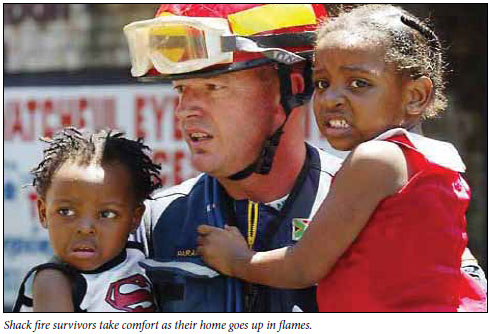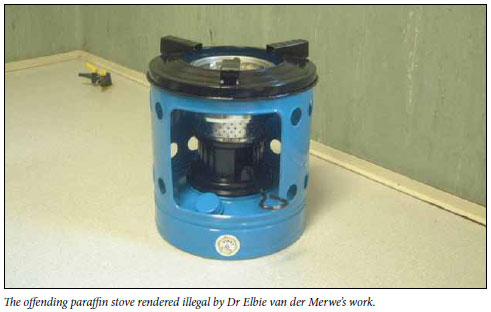Serviços Personalizados
Artigo
Indicadores
Links relacionados
-
 Citado por Google
Citado por Google -
 Similares em Google
Similares em Google
Compartilhar
SAMJ: South African Medical Journal
versão On-line ISSN 2078-5135
versão impressa ISSN 0256-9574
SAMJ, S. Afr. med. j. vol.101 no.8 Pretoria Ago. 2011
IZINDABA
Tygerberg Burns chief wins global award

Tygerberg Hospital's Burns Unit chief, Dr Elbie van der Merwe, one of the country's most holistic and innovative burns specialists, has received international recognition for her ground-breaking local work in burns prevention, treatment and rehabilitation.
She has won the Euro-Mediterranean Council for Burns and Fire Disasters' G Whittaker International Burns Prize, and will receive the prestigious award next month (September) in Palermo, Italy. Van der Merwe (64) was the driving force behind legislation that forced the upgrading and redesign of the ubiquitous paraffin stove responsible for thousands of shack-fire deaths, injuries and hardship in the more poverty-stricken sections of townships. She lobbied parliament for years, presenting data and statistics from her research that finally led to a 2007 law that enforces a strict set of standards on paraffin stove manufacture country-wide. Her work has been adopted globally by the World Health Organization (WHO) and local follow-up studies have already confirmed a decreasing incidence of burn injury from paraffin stoves. Her retrospective review of outcomes with 1 908 patients admitted to her unit between January 2003 and December 2008 shows that 45% of them spent time in the ICU while 25.5% died. The leading cause of all burns over the 6 years was 'unspecified flame injuries' at 21.4%, with 12.4% from scalding the next highest contributor. The nationwide context was 7.5 million South Africans living in shacks with no water or electricity (255 highly combustible shacks erected check by jowl per day between 2002 and 2005) and 46 000 shacks per annum destroyed by fire. The death rate remained constant at 8.7 deaths per 100 000 people (co-incidentally the rough estimate of shack dwellers in the Cape Metropole at the time). Any patients with HIV/AIDS pre-burn injury had a particularly poor prognosis, she added.
The award also recognises a slew of Van der Merwe's other career achievements. These include playing the lead role in integrating trauma care and burn therapy and shoe-horning it onto the current South African medical academic curriculum, collaborating with national and provincial government to decentralise burns management via new burns units in peripheral hospitals and driving negotiations to establish a postgraduate burns course for nurses.

Humanitarian approach
On her home turf, she founded the Tygerberg Burn Society, a non-profit organisation for the most disadvantaged burns victims providing rehabilitation, education and psychosocial support and pioneered multidisciplinary burns care in an extensively renovated burns unit in spite of severe staff shortages, creating an Africa-wide model of care.
Van der Merwe was central in evaluating the influence of traditional medicine in burn management in Africa and has collaborated with surgical colleagues across the continent. She also teamed up with the Continuing Medical Education (CME) journal to campaign for burns management education for non-specialists and GPs.
Pioneer of 'fortitude and determination'
Dr Elmien Steyn, President of the Trauma Society of South Africa, described her as 'one of the unsung heroes of injury care, tackling initial indifference from the medical community towards the harrowing task of caring for these unfortunate patients'. With 'fortitude and determination', Van der Merwe built up a team, trained the staff and acquired the equipment and surgical resources to improve the care and rehabilitation of burns victims. Steyn said Van der Merwe headed a 'stressed and overloaded' unit dealing with all adult burn patients in the region and had overcome major adversity in an 'uphill battle over 20 years'.
'Burns are horrible, gruesome and miserable with a high risk of infection. Very few people have the guts and compassion to work with these patients and many doctors and nurses simply burn out. It's not a fashionable or very exciting field and resources are seldom forthcoming - those who stick it out are wonderful people,' she said.
Van der Merwe had trained a 'multitude' of surgeons, all of whom were impressed by the physical and mental strength 'this small woman can muster in the tough environment of the burns operating theatre'. Van der Merwe took the lead in establishing the Pan African Burns Society and continues to provide support and practical advice to burns care colleagues in resource-constrained countries. A lecturer and consultant in the Department of General Surgery at the University of Stellenbosch since 1990, the avid mountaineer is cited for her 'humanitarian, clinical, political and cultural achievements' in the field of trauma care.
Violence and injury are one of the four 'big' burdens of disease categories being prioritised by National Health Minister, Dr Aaron Motsoaledi, who quoted UNISA/MRC research showing that for every person killed by injury, 30 times as many are hospitalised and 300 times as many are treated for less serious injuries and discharged.

Chris Bateman
chrisb@hmpg.co.za














